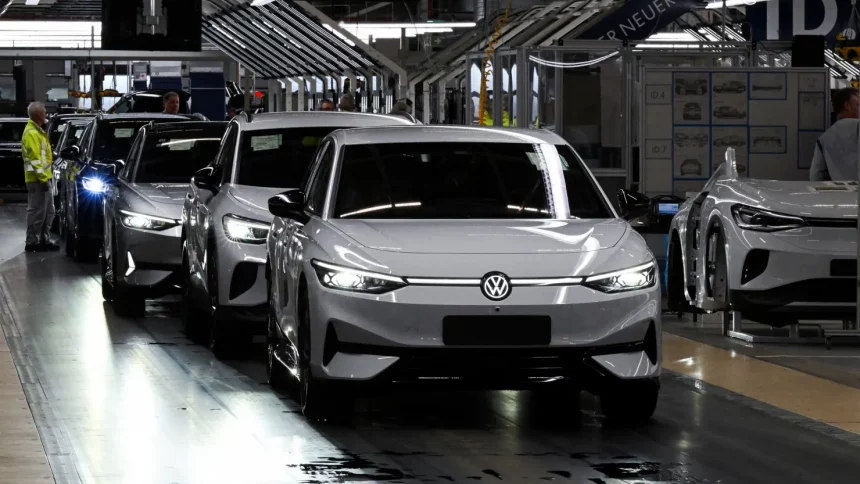The automotive industry is once again at the center of global trade tensions, as U.S. President Donald Trump imposes a 25% tariff on vehicles imported from key trading partners. While European automakers scramble to assess the impact, Volkswagen and Stellantis have confirmed that their North American-made vehicles will be exempt, while BMW braces for financial setbacks.
Navigating the Trade War: Winners and Losers
The newly reinstated tariffs come as part of Trump’s ongoing strategy to prioritize domestic manufacturing and reduce trade deficits with Canada, Mexico, and the European Union. With machinery and vehicles making up the largest portion of the EU’s exports to the U.S.—accounting for a staggering 41% of total shipments—the implications of these tariffs are profound.
However, some manufacturers have managed to sidestep the tariffs. Volkswagen, which operates several plants in North America, has confirmed that its vehicles comply with the United States-Mexico-Canada Agreement (USMCA), allowing them to remain tariff-free. Stellantis, known for brands like Jeep and Dodge, has also received an exemption, leading to a positive stock market response, with its shares rising over 2% following the announcement.
The USMCA Loophole: A Lifeline for Some
Under the USMCA, vehicles with at least 75% of their parts sourced from North America qualify for tariff exemptions. This has provided a crucial buffer for automakers like Volkswagen and Stellantis, which have invested heavily in regional production.
A spokesperson for Volkswagen stated, “Our North American assembled VW-brand vehicles meet the USMCA rules of origin and are exempted from the 25% tariffs.” The company, which owns brands such as Audi, Skoda, and Bentley, has expressed a willingness to work with policymakers to find long-term solutions that benefit both the automotive industry and the broader economy.
Stellantis has taken a similarly strategic approach, emphasizing its commitment to American manufacturing. “We share the President’s objective to build more American cars and create lasting American jobs,” the company stated, underscoring its intent to expand operations in the U.S.
BMW Faces Tariff Pressure
While some automakers celebrate exemptions, BMW is among those left facing significant levies. The German automaker has stated that it will be subject to tariffs under the current USMCA regulations, a development that could lead to higher consumer prices and a reduction in profit margins.
“Free trade has always been a guiding principle for the BMW Group,” the company emphasized in a statement, warning that tariffs could hinder innovation and disrupt market dynamics. Analysts at UBS estimate that around 10% of BMW’s U.S. sales come from vehicles imported from Mexico, meaning the new tariff could result in an EBIT (earnings before interest and taxes) impact of approximately €400 million.
The Bigger Threat: EU-Made Cars on the Chopping Block
While BMW’s Mexico-produced models are already feeling the squeeze, a potentially more significant challenge looms: additional tariffs on EU-made vehicles. The U.S. has set an April 2 deadline for a decision on these tariffs, which could further escalate trade tensions between Washington and Brussels.
Given that the EU had a €102 billion trade surplus in vehicles and machinery with the U.S. in 2023, the potential for an all-out tariff war remains high. Such a move would not only impact luxury brands like BMW and Mercedes-Benz but could also disrupt supply chains and increase costs for American consumers.
Market Reactions and Industry Outlook
Trump’s tariff policies have led to market volatility, particularly in the automotive sector. In the past month alone, fluctuations in policy announcements have triggered sharp declines in auto stock valuations, only for exemptions and delays to bring partial recoveries. The unpredictability of trade policy has left many automakers scrambling to adjust their strategies.
Looking ahead, companies that have proactively shifted production to North America may continue to benefit, while those reliant on European and Asian supply chains could face mounting pressure. As global trade negotiations unfold, automakers, investors, and consumers alike will be watching closely to see how this complex and evolving situation plays out.
The latest round of tariffs highlights the growing importance of localized production in the face of shifting trade policies. While Volkswagen and Stellantis have successfully leveraged the USMCA to avoid new levies, BMW and other European manufacturers may need to rethink their supply chain strategies to stay competitive in the U.S. market.
As trade tensions remain high, automakers must balance cost efficiency, regulatory compliance, and global market dynamics. Whether through increased North American investment, policy negotiations, or alternative production strategies, the coming months will be critical in shaping the future of the industry.
Stay tuned for more updates on global trade and the automotive sector!




